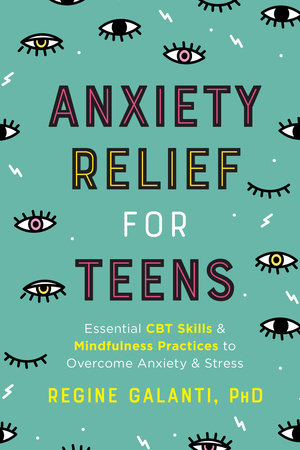When to Worry About Your
Teen’s Worries
by Regine Galanti, PhD
Do you remember your teenage self? When I look back to my teens, I think about how much it felt like I was managing a matrix of friendships, school needs, family life, and more. There was so much going on.
As a psychologist who works with teens every day, I know that some things about adolescence haven’t changed. Friendships are important – so very important – to teenagers. It’s a life stage fraught with navigating those social challenges. Then there’s school work, decisions about college, and physical changes layered on this emotional storm. Research on teenage brains shows that it’s a time of huge growth, more than almost any other stage of life. With all these physical, social, and emotional changes comes an extra sensitivity to stress. For some teens, this means anxiety. While anxiety is normal and natural (in all of us!), too much of it can get in the way of teenagers meeting their potential and goals.
So, when should you worry about what you’re seeing in your child, and when is the drama, irritability, and change just par for the course? I often field calls from distressed parents about how much their teen has changed (practically overnight!) from their sweet, innocent child to a moody, surly teenager. In these cases, my response is, “This is typically normal. That’s not anxiety presenting itself, that’s your child’s choice based on their stage in development!”
It can be hard to tell what to worry about, but first, know what is normal. Transitions, for example, are hard on everyone. Starting high school and graduating are natural points for stress, so these changes may bring on some anxiety. (We know, though, that humans are resilient, even in extreme situations.) What we expect is this anxiety will fade relatively quickly, in a few weeks or so, and for teens to adapt. Anxiety that lasts instead of fading can be a red flag.
In my practice, I also look for the way anxiety affects a teen’s functioning. What I keep an eye out for: the girl who doesn’t want to try out for soccer, even if she’s quite good, because she might trip, fall, and get embarrassed; the boy who is so afraid of failing that he won’t even try to do his homework; or the 16-year-old who still refuses to stay home without his dad in the house. In these examples, kids are getting in their own way, avoiding experiences, and hurting their present and future.
Anxiety doesn’t always look like what you’d expect. It can be a lot of worrying and question asking about things being safe, but it can also be physical:
- Stomachaches
- Headaches
- Tense muscles
- Panic attacks
If this sounds like a teen you live with, there are ways to help get them back on track to success and managing anxiety well. If you are concerned about their behavior, ask them about it. It can be hard to talk to teenagers, but showing them that you care, keeping the conversation open, and letting them know that there’s an easier way to handle challenging emotions sends them a message that they don’t have to go through this alone.
As a parent, one practical job you can do is encourage self-care through the basics: sleep routines, showering, exercise, and eating. Exercise is just as important for mental health as it is for physical health, so help your child move by having them walk the dog, do TikTok dances, whatever it takes. It also may be hard for teens to manage devices and social media. The constant scrolling is hard on anxiety and disrupts sleep. Think about creative ways to get your child to turn off when it’s time for bed – plug in any devices in the hallway or across the room, encouraging “wind down” activities before bed like reading or a quiet hobby, focusing on helping them go to sleep and wake up at a consistent time.
Finally, know that therapy is very effective in teaching practical anxiety management tools, especially a type of therapy called Cognitive Behavioral Therapy, or CBT. In CBT, teens learn practical skills to become aware of challenging thoughts and behaviors, and then learn to change any unhealthy thoughts and behaviors through a series of steps and a variety of tools. If you’re concerned, it never hurts to reach out for a consultation with a professional.
As a parent, it can be difficult to watch your child struggle, but there’s a wealth of resources that can help. The strategies that I describe here are just a few of the many CBT strategies for managing anxiety. What I’ve learned as an expert is clear: anxiety doesn’t have to control your teen’s life.

